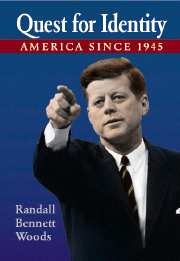Book contents
- Frontmatter
- Contents
- Preface
- 1 The Republic in Transition
- 2 The Origins of the Cold War
- 3 Staying the Course
- 4 Containing Communism and Managing the Military–Industrial Complex
- 5 Capitalism and Conformity
- 6 Liberalism Reborn
- 7 The Wages of Globalism
- 8 The Dividing of America
- 9 Realpolitik or Imperialism? Nixon, Kissinger, and American Foreign Policy
- 10 The Limits of Expediency
- 11 From Confidence to Anxiety
- 12 Governing in a Malaise
- 13 The Culture of Narcissism
- 14 In Search of Balance
- Index
11 - From Confidence to Anxiety
American Society, 1960–1980
Published online by Cambridge University Press: 05 June 2012
- Frontmatter
- Contents
- Preface
- 1 The Republic in Transition
- 2 The Origins of the Cold War
- 3 Staying the Course
- 4 Containing Communism and Managing the Military–Industrial Complex
- 5 Capitalism and Conformity
- 6 Liberalism Reborn
- 7 The Wages of Globalism
- 8 The Dividing of America
- 9 Realpolitik or Imperialism? Nixon, Kissinger, and American Foreign Policy
- 10 The Limits of Expediency
- 11 From Confidence to Anxiety
- 12 Governing in a Malaise
- 13 The Culture of Narcissism
- 14 In Search of Balance
- Index
Summary
The two decades following the election of John F. Kennedy were among the most tumultuous and troubling through which the United States had yet passed. The era began with the U.S. economy going full blast and the election of an activist president committed to progressive reform at home and enlightened anticommunism abroad. By the end of the 1960s, the country was deeply divided over Vietnam, over the place of minorities and women in American society and, in fact, over the basic values that would define the United States. The 1970s were punctuated by America's first defeat in a foreign war, the resignation of a president facing sure impeachment, and an economy caught in the twin grip of rising unemployment and increasing inflation. For the first time since its triumph over the Axis powers, Americans began to question the assumptions that underlay the Cold War, and particularly the nation's ability and obligation to promote prosperity and ensure stability around the world. The pervasive notion, so characteristically American, that each succeeding generation would be materially better off than its predecessor was also called into doubt. With the apparent end of significant economic growth and the possibility that poverty would become increasingly institutionalized, the threat of class conflict assumed proportions that the United States had not known since the 1930s. At the same time, popular and high culture reached levels of diversity and quality hitherto unknown, while the American system of higher education became the best in the world.
- Type
- Chapter
- Information
- Quest for IdentityAmerica since 1945, pp. 351 - 398Publisher: Cambridge University PressPrint publication year: 2005



